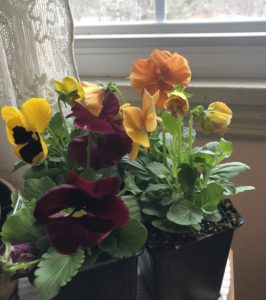We’re all staying at home these days, unless you’re—depending on your point of view—lucky or unlucky enough to have a job that still needs your presence. We’re keeping our distance, socializing only through Zoom, pirouetting around people who get too close in the supermarket.
It’s an opportunity to think about what it means not just to stay home, but to go home. And not just to go to an outer home, but to our own inner home.
At home you take off your coat and hang it in the closet among those other familiar jackets and raincoats you’ve known and worn. At home you have a favorite chair. You know where the vegetable steamer and the good china are kept. The floor creaks familiarly beneath your feet, and you can anticipate just how many seconds it takes for the hot water in the bathroom sink to reach the temperature you like. Home, both inner and outer, says philosopher Emmanuel Levinas, is a feeling of belonging. Home is an interior sanctuary in the mind as well as an interior refuge in the physical world.
The coronavirus is forcing us to think about what it means to go home and then stay home, physically, mentally, and spiritually. In our isolation, we find ourselves super-conscious of our behavior. We lose patience with our partners or roommates. We stay in our pajamas all day. We note in ourselves an increase or a decrease in compassion for others. We realize how much money we typically spent on expensive coffee drinks and, having no idea where the money will come from now, we cut back. Or we fill our anxious moments by shopping on line for things we really don’t need. Having to live with ourselves, we discover how restless or content or creative or pessimistic we really are. We have to face ourselves without the mirror of others to build us up or cast us down.
What are you coming home to in yourself. As for me, I’ve found that I’ve quit striving and pushing in the way I’ve been doing since I was a freshman in college. Since no one is able to plan these days, I’ve discovered a surprising new faith that things will unfold in some creative, unhurried way when they need to—that I, personally, don’t need to foresee, predict, plan for all outcomes, and fret that others aren’t striving and foreseeing with the same intensity.
For another thing, I’ve been pondering mortality. There have been days when I’ve been in an utter panic about my own death, that of my husband, and those of the people I love. There have been days when I’ve been preoccupied with the sacrifices of the trash collectors who come to our town on Thursday, the nurses and doctors who risk their lives every day, the women who live with alcoholic abusive husbands. There are also days when, introvert that I am, I really enjoy the opportunity to read, write, and think more. And there are days when I realize that, simple as it sounds, I will survive until I don’t, and I feel enormous comfort about that.
What are you coming home to?
What I’m reading
Of course, I’m still reading The Forsyte Saga! It’s almost 900 pages long, and I only have about a hundred pages left to read. I will miss it!
Savory Moment
My savory moment occurred last Monday. We woke up that morning to see about eight inches of heavy, wet snow on the ground. “At least we don’t have to shovel the driveway,” I said to Andy, “since we can’t go anywhere.” Much of the snow had melted by afternoon, and I went outside. I wanted to check on the daffodils that I’d planted in the meadow and on the trail leading to it when we first bought our house 32 years ago. Daffodils are my favorite flower, and I was sad to see them all bent over, their yellow blossoms pressed to the ground by snow, the green stalks flattened. I set to work liberating each daffodil everywhere I found them. Finally, my gloves soaked, I picked a bunch of them and walked back to the house. I realized I had never before picked daffodils after freeing them from snow. They have survived beautifully and continue to bloom.
